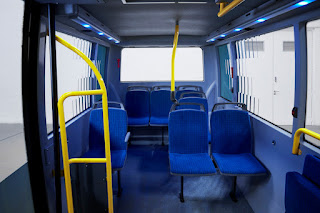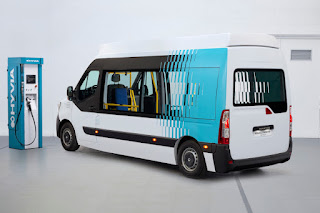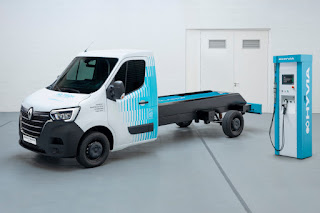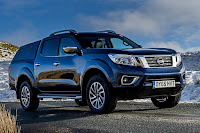Two more Renault Master H2-Tech prototypes
Last month, Renault revealed the Master H2-Tech pure-electric van that features a 30 kW hydrogen fuel cell. Now the same powertrain – which was developed by Hyvia – is being trialled in city bus and chassis cab models.
Up to nine seated plus six standing passengers can be carried in the Master H2-Tech city bus.
The fuel cell and single 4.5 kg (9.9 lb) hydrogen tank are installed in a space above the ceiling. Consequently, the vehicle’s floor height is low, allowing wheelchair access to the interior.
Anticipated range is 186 miles (300 kilometres), while the electricity generated is stored in a 33 kWh battery pack.
Arguably, the Master H2-Tech chassis cab is going to present a challenge to third-party body builders, because its fuel cell and twin 1.5 kg (3.3 lb) hydrogen tanks sit awkwardly on top of the existing frame rails.
Thanks to the reduced tank capacity, estimated range falls to 155 miles (250 kilometres).
Payload could be an issue for some prospective operators, too. Indeed, with a typical box body fitted, Renault reckons that maximum cargo weight will be around 1,000 kg (2,204 lb).
Master H2-Tech production is due to begin next year, but there’s no indication of prices yet.
Related posts:
Renault Master H2-Tech prototype unveiled
Updated 2022 Renault Trafic van now available
Up to nine seated plus six standing passengers can be carried in the Master H2-Tech city bus.
The fuel cell and single 4.5 kg (9.9 lb) hydrogen tank are installed in a space above the ceiling. Consequently, the vehicle’s floor height is low, allowing wheelchair access to the interior.
Anticipated range is 186 miles (300 kilometres), while the electricity generated is stored in a 33 kWh battery pack.
Arguably, the Master H2-Tech chassis cab is going to present a challenge to third-party body builders, because its fuel cell and twin 1.5 kg (3.3 lb) hydrogen tanks sit awkwardly on top of the existing frame rails.
Thanks to the reduced tank capacity, estimated range falls to 155 miles (250 kilometres).
Payload could be an issue for some prospective operators, too. Indeed, with a typical box body fitted, Renault reckons that maximum cargo weight will be around 1,000 kg (2,204 lb).
Master H2-Tech production is due to begin next year, but there’s no indication of prices yet.
Related posts:
Renault Master H2-Tech prototype unveiled
Updated 2022 Renault Trafic van now available







+Front+Side.jpg)


%2BFront%2BSide.jpg)



Comments
Post a Comment